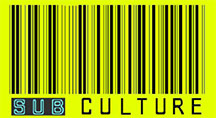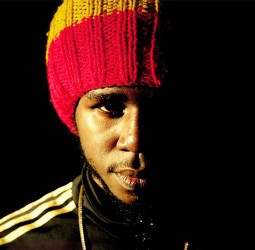When it comes to reggae, dancehall, soca and chutney, we Guyanese tend to pride ourselves on our link to the Caribbean; none of these genres might have originated here but we sure do take them and make them seem so.
So, as a Guyanese who has lived here her entire life, you can imagine how embarrassing it is to confess that I am not an avid lover of any of the aforementioned genres.
Please, hold the pitchforks, torches and brimstones.
There are a few exceptions; there are times when I would hear a particularly bouncy reggae or dancehall tune and begin bobbing my head before I realize that this is completely out of character and checked myself before I wrecked myself.
 However, recently I’ve found myself progressively falling in love with Chronixx’s EP ‘Dread and Terrible’.
However, recently I’ve found myself progressively falling in love with Chronixx’s EP ‘Dread and Terrible’.
If this is your first time hearing about Chronixx, I’ll try to sum him up in one sentence: Chronixx is a young, Jamaican, dreaded reggae artiste who gained a lot of popularity this year simply because he is genuinely talented.
Chronixx, born Jamar Rolando McNaughton, is one of those artistes I would tell myself to check on YouTube before never getting to it. It didn’t help that, on the few instances I would log in to Facebook, there would be persons posting song lyrics and sharing links of his performances. In a way, my ‘inner hipster’ rebelled at the thought that I would join the throngs of admiring fans that Chronixx seemed to recently acquire.
However, I eventually heard a song I liked, found out it was his and, after that, I pretty much Christopher Columbus’d him – I “discovered” his music which had been there ages before my arrival before proceeding to strip it down and abuse it (by playing it over and over again, that is).
 What I enjoyed most about Chronixx’s EP is the unexpected sound of almost every song; reggae had always been a genre with a message and – out of all the genres I disliked – it was the least disliked for that very reason.
What I enjoyed most about Chronixx’s EP is the unexpected sound of almost every song; reggae had always been a genre with a message and – out of all the genres I disliked – it was the least disliked for that very reason.
However, recently I had not heard enough of that so Chronixx’s EP was a breath of fresh air. According to one critic, Chronixx is part of the “new-school roots”, a bit of “Rasta meets hipster.”
“We are not going to do it like Bob Marley did or like Burning Spear did,” Chronixx says in an interview about himself and his band, The Zincfence Redemption. “We are using their blueprint to bring on a new generation of works.”
What I most enjoyed about the EP was the perception behind it all; Chronixx is 22 but he is way too conscious for his age.
“Century pon top a century full a sufferation/And after four hundred year mi say no reparation/ And now dem wan’ fi kill we wid taxation/But ah beg you please take me to the mother land,” Chronixx croons in his track “Capture Land” and a part of me wants to defiantly raise a fist as I struggle to sing along.
If you need proof of his talents, begin to YouTube his performances as obsessively as I did: he makes the buffer worth it. The guy really does know how to put on a show and I could only imagine how much better it’d be if I were actually there and not in front of a very blurry YouTube screen.
Chronixx’s popularity has noticeably surged since those performances and understandably so; people—but particularly Americans—love all things Jamaican and I think secretly we’ve all been looking for a modern-day Bob Marley. No one’s there yet but that’s not going to keep us from wishing and hoping.
Chronixx performed on the popular Tonight Show starring Jimmy Fallon and, following that performance, the sale of his EP moved from 400 units to 5,000 units. Nielsen SoundScan also showed that downloads of his popular song “Here Comes Trouble” jumped from 1,000 downloads to 12,000 downloads and with the added downloads Chronixx earned the No 2 position on the Digital Reggae Singles chart.
 Needless to say, these are huge accomplishments for anyone, especially one as young as Chronixx.
Needless to say, these are huge accomplishments for anyone, especially one as young as Chronixx.
Let’s not forget that he had the opportunity to perform in Central Park in front of 5,500 persons including the legendary Mick Jagger. In fact, from what I’ve read, about 2,000 other persons who couldn’t get into the Central Park show simply waited around outside instead of going home; some even climbed trees to catch a glimpse of Chronixx in action.
But, while noting his accomplishments, I begin to wonder, “Why aren’t Guyanese doing the same?”
I might be just a tad unfair; from a young age Chronixx had a strong reggae influence from his family and dedicated himself to the art early on; he plays a number of instruments and equates his work to that of a doctor’s.
“It’s just like, before you go out there and do a surgery on a human being, you have to learn medicine, biology, chemistry—all the things you need to be a doctor,” Chronixx said in an interview late last year. He went on, “And in reality, artists don’t do much different from doctors; they heal people. So you have to learn your craft good. It’s a science. You have to learn the history.”
Indeed he has thrown himself into it and expecting the same of others might be asking too much. However, why are we not seeing even half of this determination here? Or, why is that determination not translating into something successful outside of Guyana?
After years of watching the Guyanese music industry attempt to get off the ground but never really take off, and then to see our regional counterparts thriving in this area, there are serious questions we all should ask.
Of course, there are exceptions to the rule. Eddy Grant is one; his a name well-known internationally. Reggae band First Born did really well regionally.
I would hate to think that our people are not talented enough and that certainly can’t be it when we see how we thrive in other areas. But then we see local acts, which ought to be making waves at least regionally if not internationally, flounder to keep their heads above the water. Many of them return to Guyana and perform at local events and though it is commendable that they are supporting the local music scene, it becomes a problem when that is all they are restricted to.
Many of these artistes return to Guyana and end up staying; it seems like they are hoping to make a quick buck here rather than duke it out in another country with hopes of catching a break.
So, what is it then? Is there not enough support? Are Guyanese artistes not dedicated enough? Do we lack vision?
It is an issue that needs to be addressed but I fear that it might not be solved any time soon.
Do you feel lucky, punk? Then drop me a line at
thatpopculturechick@gmail.com









